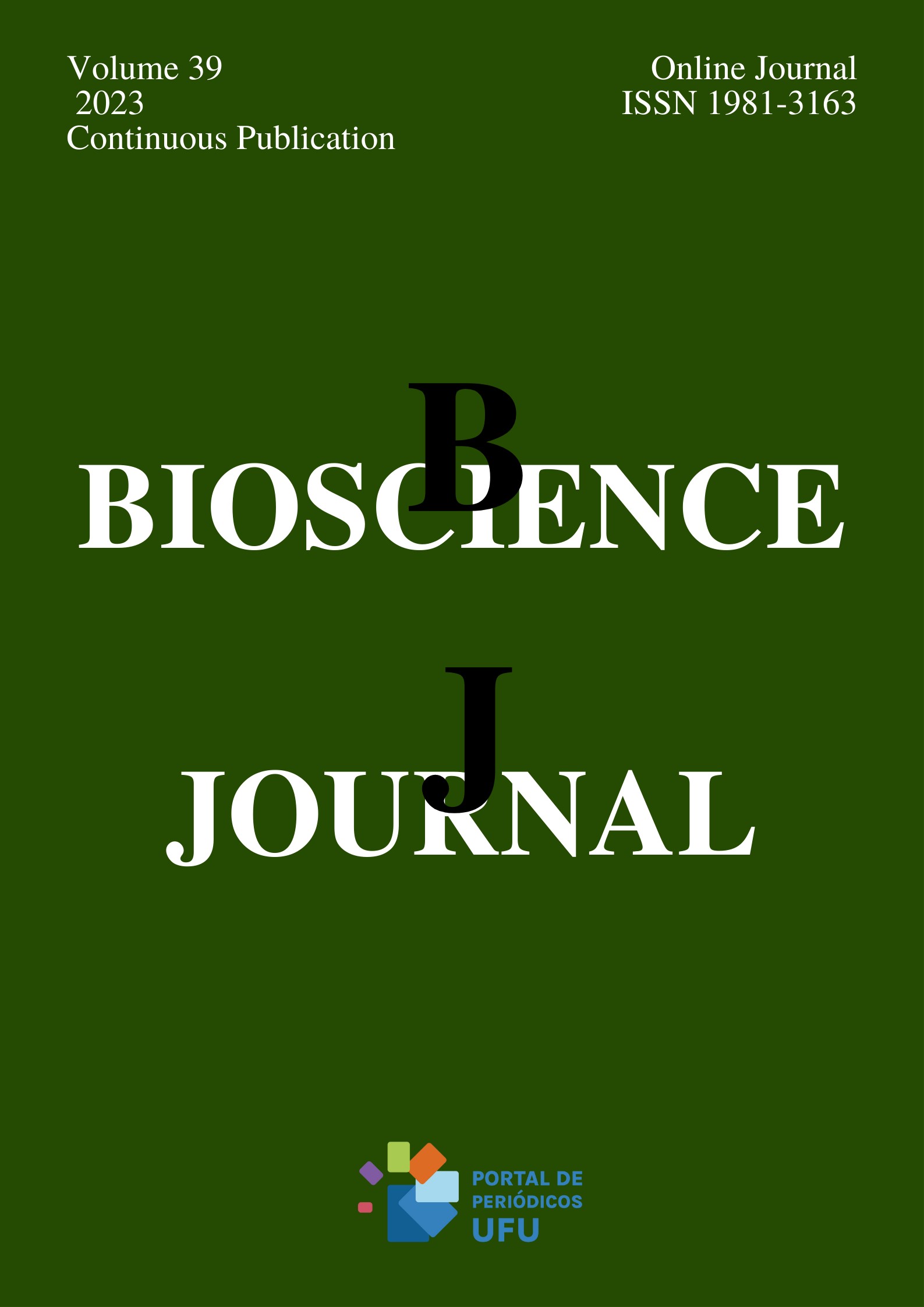The presence of parasitic structures in sandy soil samples from beaches located along the north coast of Rio Grande do Sul, Brazil
DOI:
https://doi.org/10.14393/BJ-v39n0a2023-63281Keywords:
Beaches, Environmental contamination, Geohelminth, Helminths, Sand.Abstract
Beaches are a source of parasite contamination because protozoan cysts and helminth eggs and larvae can remain viable in sandy soils for months. Parasitic infections are mainly related to hygiene conditions, health, and environmental education, and can affect the life quality of the population. Therefore, this study aimed to assess the presence of parasitic structures in five beaches located along the north coast of Rio Grande do Sul, Brazil. Eighty samples were collected in August and September 2020 at the beaches of Torres, Tramandaí, Capão da Canoa, Arroio Teixeira, and Arroio do Sal and processed with the spontaneous sedimentation method for microscopic analyses. The results showed that 32% (26/80) of samples were positive for the presence of parasitic structures, and there was a significantly higher frequency of positive samples in September than in August. Torres was the beach with the highest frequency of positive samples, while Arroio Teixeira and Arroio do Sal presented the lowest frequency of contamination. Nematode larvae, including hookworm larvae, were the most prevalent parasitic structures in the samples. Hence, the sandy soil from beaches must be monitored to develop programs and strategies for improving infrastructures and basic sanitation conditions, thus ensuring the health of the population.
References
ARAÚJO, A.N.M., et al. Prevalence of enteroparasites in beach sand in the municipality of São Luís-MA. Research, Society and Development. 2020, 9(3), e120932631. https://doi.org/10.33448/rsd-v9i3.2631
ARAÚJO, A.M.B., et al. Soil contamination by zoonotic parasites in leisure areas: an integrative review. Journal of Tropical Pathology. 2021, 50(1), 7-20. https://doi.org/10.5216/rpt.v50i1.68593
BETHONY, J., et al. Soil-transmitted helminth infections: ascariasis, trichuriasis, and hookworm. The Lancet. 2006, 367(9521), 1521-1532. https://doi.org/10.1016/S0140-6736(06)68653-4
BRASIL, CONSELHO NACIONAL DO MEIO AMBIENTE – CONAMA, 2000. Resolução CONAMA n° 274 de 29/11/2000. Normas Brasil. Available from: https://www.normasbrasil.com.br/norma/resolucao-274-2000_96898.html
CENTERS FOR DISEASE CONTROL AND PREVENTION – CDC, 2019. Parasites – Echinococcosis. Available from: https://www.cdc.gov/parasites/echinococcosis/biology.html
CRAUSE, D.H., AMORIM, R.F. and SOUZA, M.A.A. Geohelmintos em praias da praia de Conceição da Barra, Espírito Santos, Brasil. Scientia Vitae. 2018, 6(21), 23-29.
DALZOCHIO, T., ARALDI, J. A. and STUANI, L. Scenario of the prevalence of parasites in soil/sand samples in Brazil: systematic analysis. Saúde e Meio Ambiente: Revista Interdisciplinar. 2020, 9, 233-247. https://doi.org/10.24302/sma.v9i0.2708
ETEWA, S.E., et al. Geohelminths distribution as affected by soil properties, physicochemical factors and climate in Sharkyia governorate Egypt. Journal of Parasitic Diseases. 2016, 40(2), 496-504. https://doi.org/10.1007/s12639-014-0532-5
INSTITUTO BRASILEIRO DE GEOGRAFIA E ESTATÍSTICA – IBGE, 2021. Available from: https://www.ibge.gov.br/cidades-e-estados.html?view=municipio
INSTITUTO BRASILEIRO DE GEOGRAFIA E ESTATÍSTICA – IBGE, 2020. Geociências. Available from: https://www.ibge.gov.br/geociencias/downloads-geociencias.html
JACINTO, S.M., et al. Formas evolutivas de parasitos zoonóticos em amostras de areia de praia no município de Ubatuba-São Paulo, Brasil. Revista Ciência e Saúde Online. 2020, 5(2), 45-50.
JUNIOR, J.C.A., et al. Parasitic contamination in the soil of beaches from Mosqueiro Island, Pará State, Brazil. Journal of Health and Biological Sciences. 2021, 9(1), 1-6. https://doi.org/10.12662/2317-3206jhbs.v9i1.3401.p1-6.2021
LABRUNA, M.B., et al. Prevalência de endoparasitas em cães da área urbana do município de Monte Negro, Rondônia. Arquivos do Instituto Biológico. 2006, 73, 183-193.
MACIEL, J., ESTEVES, R. and SOUZA, M. Prevalência de helmintos em areias de praças de São Mateus, Espírito Santos, Brasil. Natureza Online. 2016, 14(2), 15-22.
MARQUES, J.P., et al. Contamination of public parks and squares from Guarulhos (São Paulo State, Brazil) by Toxocara spp. and Ancylostoma spp. Revista do Instituto de Medicina Tropical de São Paulo. 2012, 54(5), 267-271. https://doi.org/10.1590/S0036-46652012000500006
MARTINS, R.S. and ALVES, V.M.T. Análise de areias de parques públicos nos municípios de Castelo e Cachoeiro de Itapemirim, Espírito Santo. Pubvet. 2018, 12, 1-9. https://doi.org/10.22256/pubvet.v12n5a81.1-9
NERY, J.T. Dinâmica climática da região Sul do Brasil. Revista Brasileira de Climatologia. 2005, 1(1), 61-75. http://dx.doi.org/10.5380/abclima.v1i1.25233
NETO, J.J.G., FARIAS, J.A.C. and ROCHA, T.J.M. Contaminação de areia por parasitos de importância humana detectados nas praias da orla marítima de Maceió-AL. Arquivos Médicos dos Hospitais e da Faculdade de Ciências Médicas da Santa Casa de São Paulo. 2017, 62(2), 81-84.
NEVES, D.P. Parasitologia Humana. 13 ed. São Paulo: Atheneu, 2016. 559 p.
PEDROSA, E.F.N.C., et al. Contaminação ambiental de areia de praias de Fortaleza-Ceará. Journal of Health & Biological Sciences. 2014, 2(1), 29-35. http://dx.doi.org/10.12662/2317-3076jhbs.v2i1.43.p29.2014
RAMOS, E.L.P., et al. Parasite detection in sand from bays on the north coast of São Paulo state, Brazil. Revista de Patologia Tropical. 2020, 49(3), 191-205. https://doi.org/10.5216/rpt.v49i3.63783
ROCHA, S., et al. Environmental analyses of the parasitic profile found in the sandy soil from the Santos municipality beaches, SP, Brazil. Revista do Instituto de Medicina Tropical de São Paulo. 2011, 53(5), 277-281. https://doi.org/10.1590/S0036-46652011000500007
ROCHA, M.J., WEBER, D.M. and COSTA, J.P. Prevalência de larvas migrans em solos de parques públicos da cidade de Redenção, estado do Pará, Brasil. Revista Pan-Amazônica de Saúde. 2019, 10. http://dx.doi.org/10.5123/s2176-6223201901607
ROSA, N.B., et al. Análise parasitológica e microbiológica de áreas de recreação no interior do estado de Rondônia. Brazilian Journal of Surgery and Clinical Research. 2018, 23(3), 26-30.
SANTIAGO, A.C. and GAGLIANI, L.H. Estudo da prevalência de enteroparasitas em areias de praia do município de São Vicente-SP-Brasil. UNILUS Ensino e Pesquisa, 2011, 8(15), 5-19.
SELLAU, J., et al. The underlying cellular immune pathology of Entamoeba histolytica-induced hepatic amoebiasis. Journal of Hepatology. 2021, 75, 481-482. https://doi.org/10.1016/j.jhep.2021.03.018
SILVA, G.D.D., et al. Prevalência de formas parasitárias no solo em torno de uma universidade pública em Campina Grande-PB. Journal of Biological & Pharmacy and Agricultural Management. 2019, 15, 236-258.
SOUSA, J.O., et al. Análise parasitológica da areia das praias urbanas de João Pessoa/PB. Revista Brasileira de Ciências da Saúde. 2014, 18, 195-202. https://doi.org/10.4034/RBCS.2014.18.03.02
TAMAROZZI, F., DEPLAZES, P. and CASULLI, A. Reinventing the wheel of Echinococcus granulosus sensu lato Transmission to humans. Trends in Parasitology. 2020, 36(5), 427-434. https://doi.org/10.1016/j.pt.2020.02.004
WORLD HEALTH ORGANIZATION – WHO, 2020. Soil-transmitted helminth infections. Available from: https://www.who.int/news-room/fact-sheets/detail/soil-transmitted-helminth-infections
Downloads
Published
Issue
Section
License
Copyright (c) 2023 Josandro dos Santos da Silva, Thaís Dalzochio

This work is licensed under a Creative Commons Attribution 4.0 International License.





